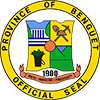About Benguet
As early as March 1990, many Cordillera leaders and educators have strongly recommended and pursued the realization of the establishment of the Baguio City School of Arts and Trades. The school was created by virtue of R.A. No. 7834, authored by the former Honorable Congressman, BERNARDO M. VERGARA which was signed into law in December 11, 1994.
However, the establishment of the school synchronized with the implementation of the TESDA Law (R.A. No. 7796) with its major mandate to provide relevant, responsive and accessible Technical Vocational Education and Training ( TVET ) to middle level manpower of the country. Due to the delayed release of funds, the school was initially and formally operationalized on June 16, 1997 by TESDA-CAR with 5 personnel. Upon release of funds, fifteen (15) personnel were added. As of now, there is a total of 21 personnel in the institution.
As the only public post secondary TESDA-administered school, it envisions itself to be a technology-based center of excellence capable of developing skillful and globally competitive middle level manpower imbued with desirable work ethics, self-discipline and self-reliance, responsive to and in accordance with national and international industry standards. Aside from such noble vision, the school is committed to provide quality instructional experiences and instilling in each member of the school environment the values of love of work, self-reliance, nationalism and God-Centeredness.
It also adopts a market driven approach to program development and implementation and establishes a strategic partnership with business and other government and non-government organizations to ensure the continuing alignment of programs with the manpower needs of industries.
The school offers two priority courses: the two-years Hotel and Restaurant Services and the two years Tourism Services. It adopted the Competency-Based vocational education and utilized the Dualized Training Program (DTP) as a mode of training delivery. This mode uses the school and the place of work as learning venues for the trainee’s mastery of skills and other competencies required by the occupational areas.
Aside from the regular programs, the school also offers short term courses such basic and advance bartending, basic and advance baking, waitering, food processing, building wiring installation, electrical appliance repair and basic floristry. All of which has a duration of one month.

Leave a Reply
You must be logged in to post a comment.


No Responses